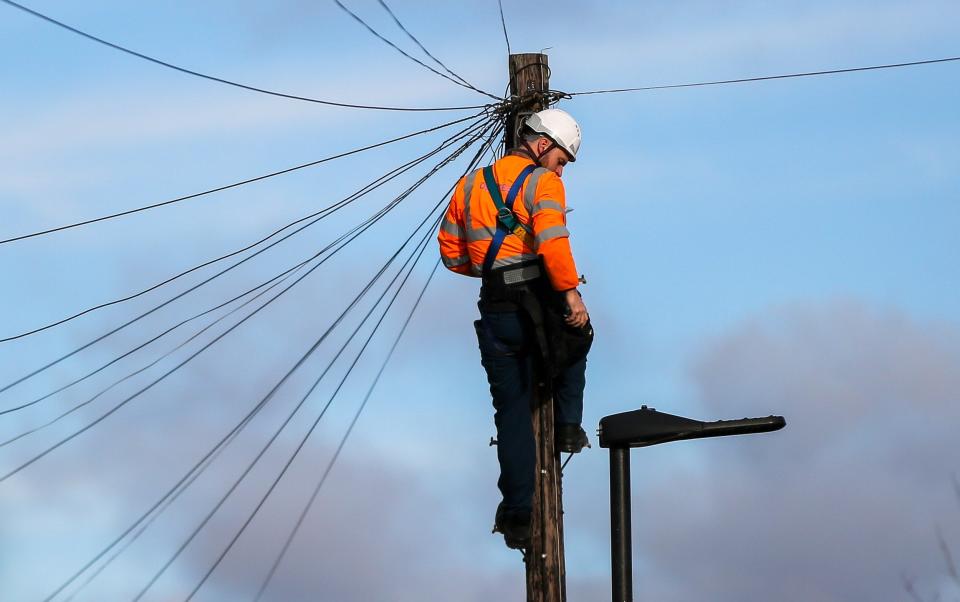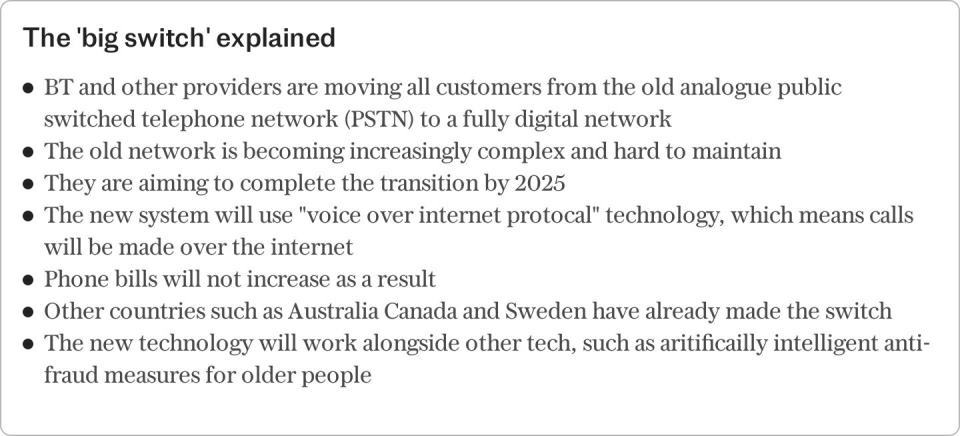Digital landline switchover delayed amid emergency alarms crisis

Plans to rip out traditional landlines and replace them with digital alternatives have been delayed after emergency alarm outages sparked a health crisis.
BT has warned the Government it will not meet the target of moving customers from copper landlines to a new digital network by the end of 2025.
Ministers are currently in discussions with the telecoms giant about a new timeline, but sources said the process could be delayed by up to two years for some vulnerable people.
BT and rival Virgin Media have paused their rollout of digital phone lines amid fears the technology update could put elderly people at risk.

Michelle Donelan, the technology secretary, has demanded action from network operators after a number of serious incidents where so-called “telecare” devices – personal alarms designed to be activated in a health emergency or after a fall – failed because of digital landlines.
An estimated 1.8 million people in the UK rely on personal alarms for urgent medical help, the majority of whom use BT’s network.
The alarms, which are typically worn around the neck or wrist, are connected to a user’s landline and automatically send an alert to a response centre when triggered.
But there are questions over the reliability of the service as traditional copper lines are replaced with a digital service, which is more liable to failure when there is a power cut or other network disruption.
The crisis has sparked furious finger-pointing by network operators, private care providers, local authorities and the Government over who is responsible for issues with the switchover.
Rob Orr, Virgin Media O2’s chief operating officer, last year said telecare companies and councils had to “step up” to help the process.
The company urged ministers to create a new telecare charter for the industry or to draw up new rules to ensure nobody is left behind.
Industry sources also expressed frustration at the Government for failing to grasp the nettle in the switchover, describing officials as “slippery shouldered”.
Ministers are understood to have shown willingness to support a public awareness campaign about the digital landline migration, though such an initiative has yet to be confirmed.

While the delay will help to assuage fears of potentially life-threatening outages, there are also concerns about the risks of relying on Britain’s ageing copper network.
Traditional landlines are becoming increasingly unstable, while many parts are no longer being produced, scuppering repairs.
Last year the number of incidents related to copper landlines increased by a fifth, with a 60pc increase in the number of service hours being lost, according to data from Ofcom.
In addition to discussions with industry, the Government is also in talks with telecare companies about how they can help customers through the transition.
It is understood that Virgin Media, which is migrating a smaller number of customers than BT, will restart the process in the next few weeks on a voluntary basis for non-vulnerable people.
A BT spokesman said: “We’re working closely with the Government and Ofcom as we continue the important programme to move customers onto digital landlines.
“Our priority remains doing this safely, supporting our vulnerable customers and those with additional needs in particular, and we’re working with key organisations that represent these groups to achieve that.
“This includes encouraging more local authorities and telecare providers to make us aware of telecare users so we can make sure they get the right support at the right time.
“The current pause will have an impact on the timing of the overall programme – but we are working to minimise any delays, as the switch to digital landlines is a necessity given the increasing fragility of the analogue landline network.”
A spokesman for the Department for Science, Innovation, and Technology, said: “The decision to switch off the analogue landline network has been taken by the telecoms industry, and the UK Government has no formal role in administering the switchover.
“Deciding timelines for its completion is a matter for providers, but we continue to engage with the industry to ensure vulnerable customers are protected throughout this process.”

 Yahoo Finance
Yahoo Finance 